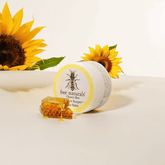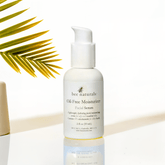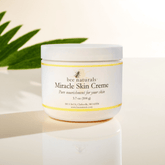The Truth About Parabens Part 1: Understanding What They Are
Have you ever heard of parabens? If you happen to be someone who pays attention to the ingredients in your personal care products, then the likelihood is that you’ve come across the term before. Parabens have become a popular subject of discussion in recent years, particularly with growing concerns about their safety and potential health risks.
While some people tend to avoid products containing parabens altogether, others maintain that they are entirely safe to use. So, what is the truth behind parabens? This article explores the science behind parabens and examines the latest research on their safety, effectiveness, and possible alternatives. Prepare to gain a comprehensive insight into parabens and make knowledgeable decisions regarding the products you use daily.
What are Parabens?
Parabens are synthetic preservatives commonly used in personal care products, cosmetics, and pharmaceuticals, from shampoos to lotions, deodorants, makeup, and even food products. These preservatives aim to prolong the shelf life of these products and prevent bacteria and mold growth. Parabens are prevalent in the beauty industry due to their effectiveness, low cost, and ability to protect products from microbial growth.
Typically, parabens are listed on product labels with prefixes such as methyl-, ethyl-, propyl-, and butylparaben. Yet, despite their widespread use, parabens have come under significant scrutiny in recent years due to concerns about their potential health risks, including breast cancer and reproductive issues.

The Study That Sparked Concerns about Parabens
In 2004, a study published in the Journal of Applied Toxicology explicitly linked exposure to environmental chemicals with increased risks of developing breast cancer. Among these chemicals are endocrine-disrupting chemicals (EDCs) – exogenous chemicals that tend to interfere with endogenous hormones.
The most common examples of EDCs are dioxins, polychlorinated biphenyls, bisphenol A, and parabens. In the case of parabens, the study found traces in breast tumors, resulting in concerns that they might contribute to breast cancer development. As a result of this study, there was a significant increase in consumer awareness and apprehension, resulting in a demand surge for paraben-free products.
Debunking the Study
While the 2004 study linking parabens to breast cancer sparked concerns and led to a surge in demand for paraben-free products, it was later debunked due to several limitations and flaws in the study design. Some of these limitations included small sample size, the fact that it didn’t explicitly prove causation, and the levels of parabens detected in breast tumors were similar to those found in non-cancerous breast tissues.
Furthermore, the study failed to explore other potential factors that could contribute to breast cancer development. Following the publication of the 2004 study, several subsequent studies have been conducted to investigate the possible link between parabens and breast cancer. However, these studies have yet to be able to replicate the original findings. A systematic review of multiple studies on parabens and breast cancer also concluded that the evidence supporting a causal relationship between the two is weak.
Despite the scientific consensus that parabens are safe to use in personal care products, the concerns surrounding this preservative have already taken root in the mind of consumers. As such, many people began avoiding products containing parabens, leading to a shift in consumer behavior.
Impact of the Study on Industry Standard
The fallout from the 2004 study on parabens significantly impacted the personal care product industry. As a result of customer concerns and shifting preferences, many companies began to offer paraben-free products or reformulate their existing products to exclude parabens. This new pattern in customer demand resulted in changes to industry standards and impacted the products and companies that dominated the market.
Following the study’s publication, several companies in the personal care industry faced significant challenges in meeting the evolving demand of customers. However, the shift towards paraben-free products also presented opportunities for smaller companies to gain market share, resulting in increased competition within the industry.
Furthermore, the effect on industry standards was also significant. Despite parabens being deemed safe by several regulatory bodies, the industry standards continued to shift to accommodate customers’ concerns and meet their demands, with many companies avoiding parabens altogether.
Understanding Parabens: Why They Are Needed and Work So Well
As we’ve seen, parabens represent a class of widely used preservatives used in personal care products for many years. They have proven effective at preventing bacteria and mold growth in care products, which is essential in maintaining their safety and quality. But how exactly do they work?
Parabens disrupt the growth and reproduction of microorganisms in personal care products. They achieve this by interfering with the activity of enzymes vital for bacteria and fungi growth. This process helps to prevent the proliferation of harmful microorganisms that can lead to product spoilage and compromise the safety of personal care products. By inhibiting microorganism growth, parabens help extend personal care products’ shelf life, ensuring that they remain safe and effective for use over an extended period.
Why Are They Needed?

The chemical composition of personal care products is such that they can become contaminated with harmful bacteria and fungi, which could pose a risk to the user’s health. Manufacturers avoid this by implementing parabens to maintain the safety and quality of these care products.
Following the 2004 study, parabens have been extensively studied and are considered safe for personal care products in concentrations up to 0.4%. This finding is according to regulatory bodies such as the European Union and the United States Food and Drug Administration (FDA).
Despite some controversy surrounding their use, the scientific evidence supports their safety and efficacy in personal care products. Parabens have been used in personal care products for many years and remain an essential component in maintaining the safety and quality of many personal care products.








Leave a comment
Please note, comments need to be approved before they are published.